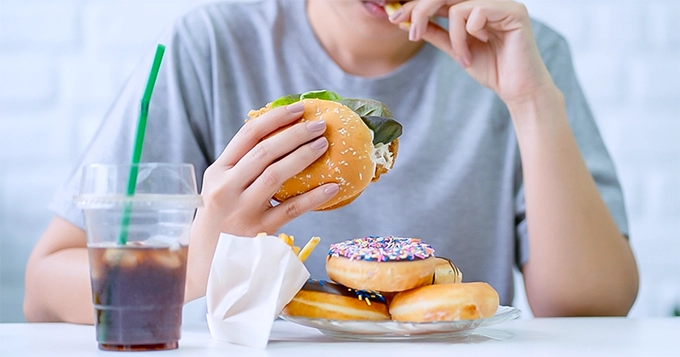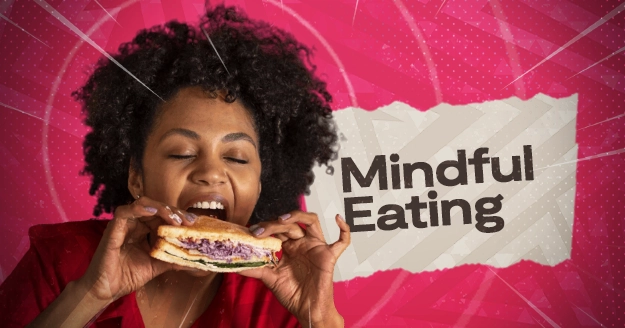Have you ever felt like eating cookies or a bag of chips or drinking wine after a stressful day at work? If so, you’re not alone. According to studies, stressful situations stimulate the reward, cognition, and metabolic systems.
Stress eating or emotional eating is the act of using food to console yourself, dull painful emotions, or distract yourself from challenging feelings. When you eat to satisfy your emotions, you frequently do so hastily and mindlessly.
Is stress eating an emotional eating disorder?
People who are struggling with emotional eating may be at risk for binge-eating disorder and bulimia nervosa – two disorders whose symptoms include emotional eating and over eating. However, stress eating does not automatically indicate a stress eating disorder. It’s vital to address the issue and find ways to control your emotional hunger before it becomes an out-of-control habit.
An example of disordered eating is:
- being extremely picky about what you eat
- food classification into “good” and “bad”
- frequent food restriction or dieting
- often, emotional eating takes precedence over physical hunger
- erratic mealtimes
- food-related obsessions that start to interfere with your daily life
- feeling guilty or ashamed after consuming what you consider to be “unhealthy”
Consult a registered dietitian or a mental health professional if you are noticing issues or if you believe you have disordered eating habits. To get help, you don’t need to have an eating disorder diagnosis. You should enjoy a healthy relationship with food.
Why does emotional eating happen?
Almost everything can make someone want to eat. Typical extrinsic causes of emotional eating include the following:
- Work stress
- Overwhelmed with school
- Financial worries
- Health issues
- Relationship struggles
People who have a history of dieting (especially following strict diets) are more likely to engage in emotional eating.
Other potential internal causes include:
- Not realizing how you feel (are you physically hungry with a rumbling stomach or just craving comfort food)
- lack of ability to describe or process emotions
- inability to manage emotions
- the under-active cortisol response to stress
Stress eating can be a hard, unhealthy habit to break, but with mindfulness techniques, it is possible to regain control of your eating habits. Here are some tips to help you become more mindful when eating:
Listen to Your Body
Keep track of whether you are craving food because you are hungry (your stomach is growling) or because of other signs. If you’re thirsty, drink water. Try walking your pet, playing a game, or reading a book if you’re bored. Try some deep breathing or meditation if you’re feeling tense or anxious. Food is not a patch for your emotions; it is nourishment for your body.
Learn When to Stop
Pay attention to your physical feeling when hungry or full. Stop eating, even if there’s food left on your plate, when you feel satiated and full. You don’t have to eat everything. You can save and eat the rest for later.
Rate Your Hunger
To gauge your hunger, use a scale with points ranging from 0 (extreme hunger) to 10 (overeating). Prior to eating and again around midway through a meal or snack, assess your hunger. After your meal, wait around 15 minutes before reevaluating your appetite. Take note of how eating affects your feelings of contentment and hunger. By routinely using this scale, you can learn when you are actually hungry and learn to stop eating when you are full rather than overeating.
Pay Attention to Your Food
Switch off the TV. Put down the phone. When you become aware of distractions, pay attention and slowly return your focus to your meal. Take note of the food’s flavors, textures, and visual appeal. Mindful eating is a talent that you can learn and hone with practice, just like any other.
Make Eating an Experience
Appreciate your surroundings. Give thanks to the folks who raised, transported, and prepared the food you are going to eat for a moment. Consider the aroma, tastes, colors, textures, temperatures, and other sensory aspects of the food you are consuming. You could discover that developing these habits helps you choose foods more carefully and have more pleasurable meals.
Eat Slowly
After you start eating, it can take up to 20 minutes before your body sends various signals to your brain that cause you to feel satisfied. When you eat too rapidly, your brain may not receive the fullness cue before you overeat. Give yourself enough time to eat thoughtfully so you can tell when you are full. Eat slowly, chewing each bite completely. This helps you become more aware of the flavors and textures of your food, and it will also help you feel full more quickly.
Keep a Food Diary
Keep track of what and how much you eat. Also note when you eat and how you feel while eating, and also how hungry you are. You may notice trends that reflect your eating habits and the relationship between mood and food over time.
Practice Self-Compassion
Remember that breaking the habit of stress eating is not easy, and it may take time. Be kind, treat yourself well, and enjoy minor triumphs as they happen.
Using food as a comfort, a reward, or to celebrate isn’t always a terrible thing. When food becomes your major emotional coping mechanism—when your first inclination is to open the refrigerator anytime you’re anxious, unhappy, angry, lonely, weary, or bored—you become trapped in an unhealthy loop in which the true feeling or problem is never addressed.
This is why it’s important to do mindful techniques to make sure it doesn’t become a bigger problem in the future.









